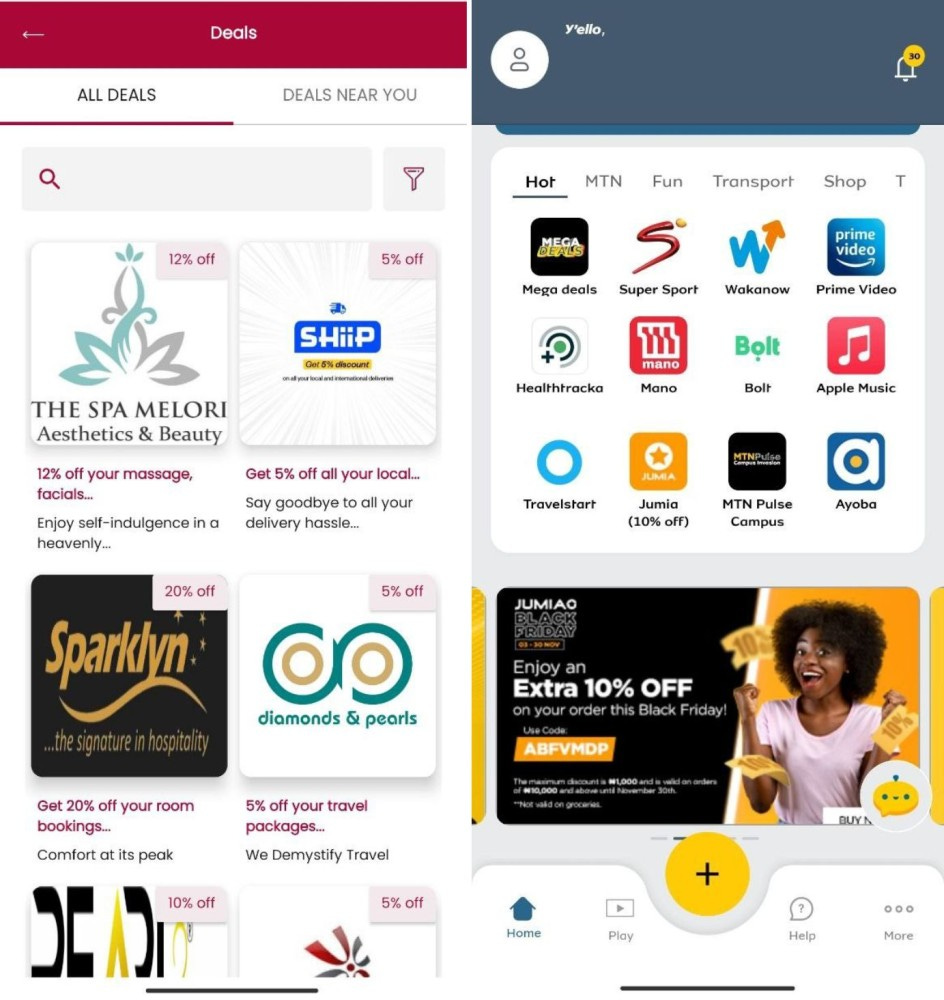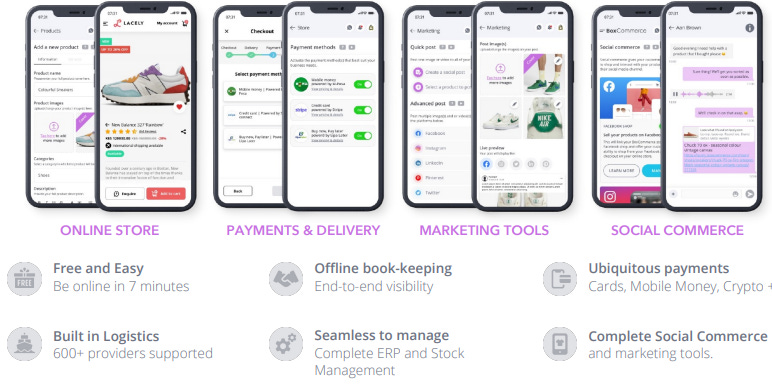BoxCommerce: Merchant solutions for the future of e-commerce.
In the world today, people can have their needs met at the click of a button. Consider the seamless experience of ordering groceries online and having them delivered straight to your doorstep in a couple of hours or the convenience of booking rides, accommodations and flights with just a few taps on a mobile app.
With this reality, consumers expect processes to get easier and more frictionless. This indicates that businesses and merchants are required to innovate and keep evolving to meet these expectations and provide the best experience for consumers.
However, in emerging markets, there are unique challenges to overcome to cater to the needs of consumers, merchants and even corporates.
Challenges Faced by Consumers
For consumers in Nigeria, online purchases are made from recognized marketplaces such as Jumia and even more from online vendors selling exclusively through Instagram and WhatsApp.
The problem faced in this market is a lack of trust. A buyer’s fear is getting exactly what they ordered and getting their products delivered on time. These issues reduce the preference for online payments at checkout points.
In Kenya, mobile payment platforms like MPESA are widely used and convenient for consumers. Online shopping is popular for its convenience and price comparison, but consumers are wary of fraudulent stores, delayed delivery, and poor return processes for defective products. In Indonesia, consumers want to spend less. Internet users are more likely to purchase goods online because of coupons, discounts, and free delivery offerings. According to a recent survey by Data Reportal, out of 63% of internet users that purchased a product or service online, 46% used a BNPL service, 55% completed the purchase because of free delivery offerings and 52% of users considered coupons and discounts. This speaks heavily to the preferences of the consumers in this region of the world where the e-commerce market is valued at $53 billion.
Challenges Faced by Merchants
For merchants, there are also problems faced while selling online through social media or marketplaces. Most merchants deal with a disconnect between inventory, payment and logistics systems that leads to problems like delayed deliveries. Additionally, merchants in markets like Kenya still rely on notebooks to track cash flow and lack the infrastructure to monitor inventory across stores.
Generally, most merchants rely on marketplace platforms like Amazon, Jumia, Konga, Masoko, Takealot and others that allow businesses to host their products online, and earn money through commissions and logistics fees. However, this also comes with some downsides:
First, marketplaces often charge high commissions on each sale, cutting into profits. For instance, Jumia’s commission rate ranges from 6% to 20%, depending on the product category and sellers are also required to pay other fees like VAT, shipping contributions, fulfillment fees, and others. These significantly reduce your profit margins, especially for high-value items.
Second, selling on a marketplace limits a merchant’s control over brand and marketing. Sellers are at the mercy of the marketplace's design, promotional strategies, and customer service policies. Additionally, marketplaces often promote competitor goods alongside your own, making it challenging to stand out and capture customer attention.
Challenges faced by Corporates
Corporates and larger businesses such as banks and telecommunication companies who are actively evolving in the digital and mobile platforms landscape have started offering marketplace value-added services on their platforms. This aggregates several other merchants into a single platform. A good example is MTN’s mobile application and WemaBank’s digital banking platform, ALAT.
For many corporate organizations, building a solid infrastructure for this would take a lot of time and is also very expensive.
The BoxCommerce Solution
With the recent trends in social commerce and direct-to-consumer methods of selling that have accelerated growth for many merchants, having a store online presence as a merchant has become a solution for increased sales. With an online store, you can tailor the website's design, navigation, and checkout process to optimize customer satisfaction and encourage repeat purchases. You can also collect valuable customer data for targeted marketing campaigns and product development.
However, for many small businesses and merchants, going digital is tough, expensive and very technical. This is where BoxCommerce steps in to provide a platform for merchants to create their online stores and manage the end-to-end processes conveniently. It’s easy to think of BoxCommerce as a “Shopify for the African market”, BoxCommerce provides solutions targeted at solving problems specific to merchants and enterprises in emerging markets.
BoxCommerce also offers social commerce and built-in marketing tools to help merchants sell on Google, Facebook, Instagram and WhatsApp, built-in logistics that cover both local and international deliveries with globally recognized partners such as DHL and UPS, and a point-of-sale tool that allows merchants to accept all payment methods and lending options used in Africa and South East Asia.
With BoxCommerce’s enterprise offering, direct-to-consumer brands and merchants can centralize and manage all their sales channels, including online stores, marketplaces, social commerce platforms, and physical retail locations, from a single operating system. This enables seamless integration and management of inventory, orders, and customer data across channels via a central point-of-sale solution. For example, a merchant who sells shoes in a physical store and has an online presence on social media can track inventory changes as customers both walk in and order online.
Additionally, banks and telecommunication companies like Standard Bank and MTN, can also leverage BoxCommerce’s marketplace-in-a-box infrastructure in the backend at a low cost to create their embedded marketplace value-added services.
Our journey with BoxCommerce
Our journey with BoxCommerce began in 2020, a year after the company was founded by its CEO, Craig McLeod. We invested initially at a pre-seed stag, and as early-investors, we have been a part of the company’s growth.
Why we invested
BoxCommerce’s solutions are market-tailored.
The company’s market-tailored approach to e-commerce solutions has been a major driver in its growth. By providing market-tailored solutions, BoxCommerce has grown its merchant base 16 times larger than Shopify in Kenya and is on track to scale even further in Africa and Southeast Asia.
2. BoxCommerce prioritizes the experience of its merchants.
Another thing that stood out to us at Greenhouse Capital is the founders’ commitment to excellence and attention to detail when it comes to the quality of the user experience and product. Merchants on the platform have given good feedback on their experience and highly recommend the platform. It's evident that the company isn’t just in it for profit; they genuinely care about providing the best possible solutions.
“I joined Boxcommerce a while ago and I plan to stay on. The website experience is a great option for sales, I hope to soon move to 100% website sales. ‘Best’ is the support you get from the Boxcommerce team. Highly recommend” Fresh Grinds and Blends – Freshgrindsandblends.com
Our Impact
Building a product like BoxCommerce requires a good amount of capital investment to create an operational product that would serve the needs of merchants before revenue generation can happen. In this business, it’s all about the product, and it’s a high-volume game where the customer’s experience holds paramount importance. The revenue is closely tied to customer lifetime value, and this can only be achieved with a robust and operational infrastructure supporting the merchants.
Operational Support We recognized the potential BoxCommerce has and have supported the company not only through capital investment and the cash runway to move forward but also by providing essential back-office support in legal and finance operations. This has helped reduce resource spend when it comes to talent acquisition at this stage.
Strategic Partnerships
With our presence on the board and our entrepreneurial background, we have supported the company as it navigates through expansion into Indonesia (a market with its e-commerce sector twice the size of Africa), Nigeria, and South Africa. We have facilitated important partnerships with industry leaders such as MTN, Standard Bank, and Transmarco and also made introductions for additional capital. We are committed to enabling BoxCommerce to reach its full potential as it targets a merchant acquisition of 500,000 across markets over the next 5 years.
Listen to Craig, speak more about the product and the impact of Greenhouse Capital.
Our forward-looking view on E-commerce in Emerging Markets
The rise of social commerce and live shopping:
Buying goods and paying for services through social media platforms is known as social commerce and this market is rapidly expanding across Africa, the Middle East and Asian markets. On average in Africa and South East Asia, an individual spends over three hours on social media platforms like WhatsApp, Instagram, TikTok and WeChat every day. With people spending so much time on social media, it offers shoppers a convenient way to make purchases and merchants a good means for promoting their products.
Even more exciting is the development of live shopping or live commerce. Live commerce combines instant purchasing of a featured product and audience participation. In China, live commerce has transformed the e-commerce landscape as consumers are inclined to trust when they can see the product in action and get recommendations from live streamers.
The rise of social commerce and live shopping means that merchants need to think deeper into their marketing strategies, prioritizing influencer marketing, content marketing and digital marketing strategies. By building solutions for merchants in these markets, BoxCommerce has aligned with this market trend ensuring their platform offers the tools needed to sell products across social media platforms from advertising tools to payments and logistics.
2. Mobile money and payments:
The increased use of mobile payments is another major driver of e-commerce growth in Africa and Southeast Asia. Mobile payment solutions, such as M-Pesa in Kenya and GoPay in Indonesia, have overcome traditional barriers to online payments. These mobile payment systems offer convenient, secure, and accessible payment options, enabling millions of consumers to participate in the digital economy. BoxCommerce has provided a solution to merchants that accommodates accepting all forms of payments and providing merchant lending and BNPL options.
We believe that businesses need to adapt and innovate in order to stay competitive and succeed in the rapidly evolving e-commerce market. In our next blog, we will take a deeper dive into our view on the e-commerce market in Africa and South East Asia.









